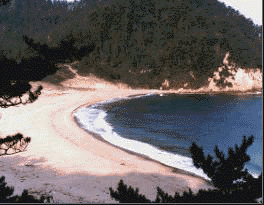Japanese
What is musical sand ?

Singing beach in Amino-chou, Japan
What is musical sand ? Musical sand on beach or desert is a silica sand which
make a peculiar sound when in moving.
The colloquially called "singing sand" in the beach is small scale phenomenon
and "booming sand" in the desert is very large scale one, but the sounding
mechanism and the quality of the sounds are, essentially, same.
Here we call "musical sand" which includes above both sands.
As the peculiar sound was lovely one, the sand have called as musical sand.
Since the nineteenth century, discoveries of this sand have been reported by excited
scientists and researchers all over the world. For example, we can find the short
comments on the sand in Charles Darwin's " Naturalist's Voyage in the Veagle"(1832)
at Rio-de-Janeiro in Brazil and Chili.
A report on Ton-Fan, from 880 A.D., in China mentions a large festival taking place
on booming sand dunes. The ancient manuscript describes a mysterious sand mountain as
follows:
"When you ride a horse or walk on the sand dune, the sound of stepping
on the sand reaches several dozen miles.
On the boy's festival day, as was the custom long ago, people living
within the castle walls used to climb Mt. Ming-sha-shan and slide down
together on the sand.
The sound produced by the sliding was similar to the rolling
of thunder."
The mountain is now called "Singing Mountain", and a nearby temple is called
the Thunder Temple.
We are confronting several difficulties in order to study this rare phenomenon now.
First, few areas in the world have sand capable of producing sound.
Thus, many people are not aware of its existence.
Second, pollution is degrading the sound-producing capabilities of some of these areas;
for instance, several squeaking sand beaches have become silent when polluted.

